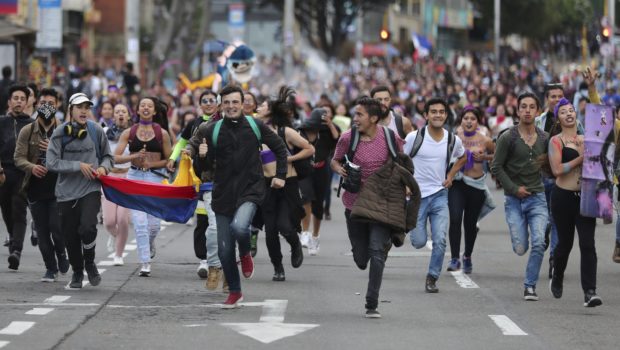Colombia goes through fifth consecutive day of protests
BOGOTA, Colombia – Students, women’s activists and indigenous people marched through the center of Colombia’s capital Monday in a fifth day of protests against the government of conservative President Ivan Duque.

Anti-government demonstrators run during a protest in Bogota, Colombia, Monday, Nov. 25, 2019. Authorities are maintaining a heightened police presence amidst scattered unrest in the aftermath of a mass protest that drew about 250,000 to the streets Thursday. (AP Photo/Fernando Vergara)
The demonstration was initially meant to commemorate the International Day of Nonviolence Against Women. But it quickly morphed into an anti-government rally during which protesters vented their frustration over issues like corruption, economic inequality and violence in rural areas.
Colombia has been rattled by protests since Thursday, when an estimated 250,000 people took to the streets amid a strike organized by unions, student groups and indigenous organizations.
The protest was the largest Colombia had seen in years, and it was followed by dozens of smaller demonstrations as well as riots that resulted in the deaths of three people and prompted authorities to impose a curfew in Bogota for the first time since 1977.
The unrest comes after mass anti-government demonstrations erupted in Ecuador, Bolivia and Chile. Those outbursts caused leaders in Ecuador and Chile to propose changes in economic policies and forced Bolivia’s president to resign.
Some Colombian protesters say they have been inspired by the events elsewhere in the region.
Article continues after this advertisement“The people have awoken” said Julio Pardo, a social sciences teacher who attended Monday’s march in Bogota. “We will no longer allow our leaders to humiliate us.”
Article continues after this advertisementIn response to the growing unrest, Colombia’s president launched a “national dialogue” Sunday to address such issues as rural violence, environmental policy and “growth with equity.”
Duque met with recently elected governors and mayors Sunday night and held talks with business leaders and some unions Monday.
He also invited the National Strike Committee, a steering group that jumpstarted the protests to talks on Tuesday. But its leaders said Duque had only offered to spend one hour with the group, and they refused to attend.
“In one hour we cannot expose our grievances” said Diogenes Orjuela, president of the Central Workers Union. “Under those conditions we cannot start talks.”
Members of the steering committee said they want a greater say over any overhaul of the pension system and labor laws as well as a tax reform plan that the government recently presented to the congress.
They have also called for more funding for public universities and are demanding a ban on fracking, a method for drilling oil which Duque has said he is open to.
It’s not clear, though, how much success the movement will have in pressing its demands.
Sergio Guzman, director of Colombia Risk Analysis, said that while protests have been steady, they have drawn only a few thousand people since Friday and momentum could fade as the holiday season approaches.
“The only way for the strike committee to get an upper hand over the government is if they intensify pressure on the streets,” Guzman said. “If they can’t do that, they will have to lower their list of demands.”
Demonstrators complain they have been treated with excessive force.
On Friday, police used tear gas on a crowd of about 2,000 that included children and elderly people as they gathered at a historic square in Bogota with pots and pans.
Marches in the center of the city were also dispersed by riot police Saturday, and an 18-year-old high school student was critically injured when he was hit in the face with a stun grenade.
On Monday, hundreds of students spread flowers and signs on the sidewalk in a vigil outside the hospital treating the student, Dilan Cruz.
“It hurts to see that he was almost killed for asking for changes, for wanting for things to improve for Colombians,” said Melissa Ceballos, a high school student holding a sign reading “No more impunity.”
Duque has promised a swift investigation of the incident in which Cruz was injured.
The government sought to keep order by arresting more than 160 people in the first two days of protests.
On Monday, Colombia’s immigration agency initiated the deportation of 59 Venezuelan nationals who were arrested by police for allegedly conducting “acts of vandalism” during the protests.